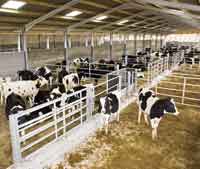Attention to detail is best way to beat mastitis

Tackling mastitis can be a challenging job – but greater attention to detail can yield significant benefits, as one college farm has discovered. Olivia Cooper reports
Most producers know the theory behind controlling mastitis – but too many do not put that theory into practice on their own farms. Busy schedules and limited skilled labour are often cited as reasons why protocols are not always followed. So when a group of farmers in Dorset got together for a series of DairyCo “Impact” workshops on mastitis, it was just the prompt they needed.
“Mastitis is such a big subject – we wanted to split it down into bite-sized chunks,” says Andrew Warner, South East extension officer at DairyCo. About 15 farmers and staff attended three meetings over the winter, hosted by different group members. Led by local vet Andy Adler from Synergy Farm Health, topics covered included drying cows off, housing over winter, environmental and contagious mastitis, risk factors around calving, and treatment options.
Nigel Allen, herd manager at Kingston Maurward College’s dairy farm, says the on-farm sessions were extremely helpful. With 100 pedigree Holstein / Friesian cows calving all year round, limited nearby pasture, and ever-changing student workers, mastitis has been hard to control. “It’s all about attention to detail and putting the theory into practice.”
Although the dairy already had stringent milking procedures, Mr Allen introduced foremilking this winter, to make it easier for students to spot mastitis cases early. “When you have new people coming in all the time, consistency can be very difficult. I believe you’re only as good as the information you are given, so I give anyone coming into the dairy as much information as I can. I have also been much more thorough with my records, and in treating and culling cows.”
The unit has a culling rate of about 20% – 5% of which are for mastitis problems – but up to 90% of cases are environmental rather than contagious. Following the DairyCo meetings, Mr Allen udder scored every cow for cleanliness, and re-examined his dry cow and summer management. “It reinvigorated my attention to detail and made me step back from the farm.”
Over winter the dry cows are housed in a straw yard, which would sometimes become over-crowded. “I don’t really have anywhere else to put them – but I could move thinner cows that have been dry for 2-3 weeks into the milking group for a short while to help them put on more weight.”
Cubicle management at the farm was already good, with Lydry added daily and fresh straw bedding laid twice a week. But cleaning out the straw yards was sometimes less stringent. “We’ve always aimed to clean out every three to four weeks, but at times it would go to five weeks.” Mr Allen has therefore developed a clear chart to identify when cleaning out and bedding up is required, and who is responsible for doing so.
He has implemented a similar tactic for summer grazing rotation and feeding. With only four fields close to the dairy, it was difficult to rotate grazing properly. Feeding at grass also caused poaching, as the feeders were rarely moved often enough.
Now, he has installed a new water trough and movable fencing, and drawn up a plan to move the cows every two weeks, leaving soiled pasture to rest for a month. Instead of permanent feeders, the students are using feeder trailers, parked in a different place each day to avoid poaching.
Mr Allen has also changed some of the products he uses to treat mastitis cases and has also started routinely treating dry cows with two new products. “I’ve become convinced that just Orbesealing isn’t good enough.”
As a result of the changes, he has already noticed a drop in cell counts and mastitis outbreaks. Cell counts have dropped from over 200 in the autumn, to 187 in March, and in the first three months of the year mastitis cases fell to 19, down from 22 last year. “Mastitis typically costs £120 a case, so we’ve already saved £360, and could potentially receive a milk price bonus as well.”
For more information on controlling mastitis, see the DairyCo website, www.dairyco.org.uk, or to set up workshops in your area contact your local extension officer.
